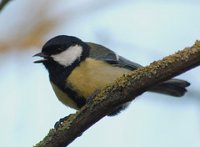The noise from our cars, factories, shops and services is drowning out some important singing in the bird world, a new study shows. We often hear bird song when we’re outdoors, sometimes those birds are telling others to keep off their patch, but sometimes they’re just looking for a new partner - something that is becoming quite a challenge in urban areas!
 The great tit, a bird that can be found all over the UK, is one of the birds affected. Male great tits sing songs to attract females to breed with, but what do they do if they can’t be heard over the din of cars, shops, people and factories? They change their tune! Great tits can change the frequency of their songs, which means that instead of singing in a low voice, they sing in a higher voice that they hope will cut through our noise pollution. But, one problem is that the females don’t like the new tune.
The great tit, a bird that can be found all over the UK, is one of the birds affected. Male great tits sing songs to attract females to breed with, but what do they do if they can’t be heard over the din of cars, shops, people and factories? They change their tune! Great tits can change the frequency of their songs, which means that instead of singing in a low voice, they sing in a higher voice that they hope will cut through our noise pollution. But, one problem is that the females don’t like the new tune.
The study showed that females prefer the lower, deeper sounding songs, but couldn’t always hear them through the noise of towns and cities. When females mated with a male who sang the highest songs they would soon leave to find a partner with a better deeper voice. Despite this challenge great tits are actually very lucky in that they can change the sound of their songs to be low or high pitched, and so at least they can be heard. They can also change the tune of their song, or learn new ones. But some birds like the dove aren’t so lucky, and may not have any way of being heard through the noise that we humans cause. Previous studies have shown that birds who change their songs suffer and populations become low, this one of the first studies to explain why.
It is surprising all the small effects that we have on the planet and its wildlife. To help the birds we may have to start thinking about how we reduce the volume of roads and factories, but in the meantime there are many other threats and challenges that birds all over the world face. Other threats which are more serious is the destruction of their habitats to build more houses and buildings, and flying into windows.
You can find out more about the great tit by visiting the RSPB website.
Photograph by aigledayres CC BY-SA 2.0
